Book Digest: January 8, 2007
One consequence of living in a largely book-demarcated reality is a useful disregard for conventions such as the reflexive (and may I suggest lemming-like) homage paid to the calendar year. Since I don’t celebrate most commercial holidays (except to give my young son, Cuba, gifts), nor do I find New Year’s Eve an extraordinary moment, I pass largely unscathed through December. Which I like to believe allows me the luxury of actually (and selfishly) attending to matters of importance (to me). Thus I am pleased that this particular rendition of this whatchamacallit includes news of some of my favorites: Robert Stone, Jim Harrison, Howard Zinn, and Francesca Woodman.
In other areas of literary interest, members of a specious (literary) cabal (you know who you are and we know who you are) have set out to undermine—though no one will admit to that worthy mission—the God-given superiority of the New York Times Book Review. Gadfly-in-chief Ed Champion has begun a wide-ranging roundtable discussion of Thomas Pynchon’s new opus Against the Day. For what it’s worth, this polylogue can also be followed at Bud Parr’s excellent cultural aggregator, MetaxuCafé.
Though I was strongly affected by Pynchon’s magnum opus V, and to some degree Gravity’s Rainbow, his new doorstop has, after some 200 pages, left me largely unimpressed and uninformed. Which may not restrain me from commenting on the commentary at the above-mentioned.
Prime Green: Remembering the Sixties by Robert Stone
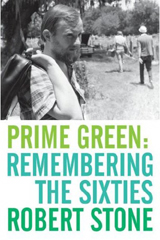
In case you have forgotten or it has escaped you, Robert Stone is the author of seven novels, including A Hall of Mirrors (a National Book Award winner), Dog Soldiers, A Flag for Sunrise, Children of Light, Outerbridge Reach, Damascus Gate, and Bay of Souls, and a short-story collection, Bear and His Daughter. This tome, his memoir of the myth-encrusted ‘60s, is made all the more compelling by Stone’s far-reaching peregrinations—New York City, New Orleans, the Antarctic, Vietnam, and Mexico—and his association with one of the era’s prime mythmakers, Ken Kesey. And in case you are not familiar with Stone’s masterful, powerful storytelling, his concern with ethical imperatives and real life, you might as well begin with his latest offering.
One thing being around and being the right age in the ‘60s gave us, was the primary sensation of time’s wheel. You could catch glimpses of the fourth dimension, now and then see the world turning… In our time we were clamorous and vain. I speak not only for myself here, but for all those with whom I shared the era and what I think of as its attitudes. We wanted it all; sometimes we confused self-destructiveness with virtue and talent, obliteration with ecstasy, heedlessness with courage. Worshiping the doctrines of Hemingway as we did, we wanted constant grace under constant pressure, and stoicism before a disillusionment that somehow never went stale. We wanted to die well every single day, to be a cool guy and a good-looking corpse. How absurd, because nothing is free, and we had to learn that at last.
Prime Green concludes:
We learned what we had to, and we did what we could. In some ways the world profited and will continue to profit by what we succeeded in doing. We were the chief victims of our own mistakes. Measuring ourselves against the masters of the present, we regret nothing except our failure to prevail.
Let the Northern Lights Erase Your Name by Vendela Vida
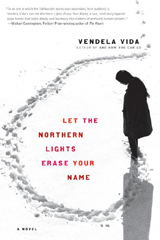
Vendela Vida’s second novel is a kind of literary thriller propelled by its 20-something protagonist Clarissa Iverton’s discovery on the day of her father’s funeral that in fact he was not her biological father—clearly a circumstance sufficient to unhinge anyone. This news is compounded by her fiancé’s revelation of a terrible secret and thus unleashes the personal havoc and turmoil that puts her on the hunt to find out the truth of her parentage—a journey that takes her to Finland and Lapland.
Vida is the coeditor of the Believer, the editor of The Believer Book of Writers Talking to Writers (in which, if I may say, you can find one of my “interviews” with Jamaica Kinkaid) and a founding board member and teacher at 826 Valencia, a nonprofit youth writing laboratory.
» Read an excerpt from Let the Northern Lights Erase Your Name
Returning to Earth by Jim Harrison
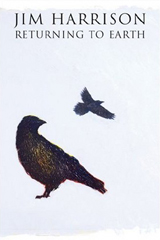
Jim Harrison’s latest novel is an offshoot of True North and the various of the Burkett family members who make an appearance in that novel. Return to Earth is the story of Donald, who is dying of ALS, and is told in three voices (four if you count his wife’s parenthetical remarks)—Donald’s; that of K, a young family friend; and that of David, Donald’s brother-in law. One of this book’s pleasures is a page (I found one such in Philip Roth’s American Pastoral) that is almost sufficient in its powerful import and meaning:
delight
» Read an excerpt from Returning to Earth
The Oldways Table: Essays & Recipes From the Culinary Think Tank by K. Dun Gifford & Sara Baer-Sinnott
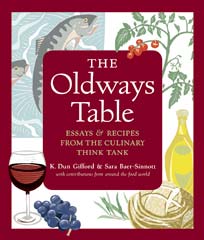
As a working journalist—as The New York Observer’s Michael M. Thomas aptly noted, taking lunch was a key responsibility—who suffered the excesses of Boston’s restaurant boom of the ‘90s, I became familiar with Dun Gifford and Oldways, as he was a fixture in the nascent and burgeoning foodie culture—a prime mover of something called the Chef’s Collaborative. The idea of a cookbook for incorporating Gifford’s mission—”a new organization to research and promote a harmony of traditional food patterns, sustainable agriculture, and healthy eating and drinking”—seems obvious, and so two decades later here it is. As Oldways is credited, along with the nutrition department at Harvard, with discovering the Mediterranean diet, there are a plethora of recipes by Paula Wolfert, Carol Field, and Nancy Jenkins. This is a nicely designed book with a seemingly nice balance of recipes and anecdotal nutritional information, useful in the pitched battle that is being waged against the depredations of the corporate food juggernaut now accurately labeled Big Food.
» Read an excerpt from The Oldways Table
Tales of the Out & the Gone by Amiri Baraka
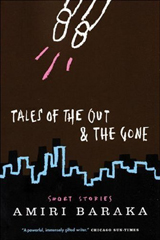
Writer LeRoi Jones, a.k.a. Amiri Baraka, has been pissing off White America throughout his long career—which would make one conclude that he has been doing his job. I am regularly reminded of Baraka as I have a sound file of him declaiming his explosive Black Dadanihilimus.
Scotch-swilling Johnny Temple’s Akashic books has published a number of deserving books of no apparent commercial potential; this career-wide compendium of Baraka’s fiction is certainly one of those. Chris Albani—a writer to watch (and read)—offers, “What can be said of Baraka’s work that would be new? That the energy is unremitting, the focus unwavering, the anger burning into a crystal rage, the questions disquieting and unnervingly raw? Perhaps that there is also a tenderness here, something like light breathing on a New York street. In this groundbreaking collection of stories—vintage, new, and previously unseen—the words only play nice, they demand that you listen, and you do and you are glad for it.”
» Read an excerpt from Tales of the Out & the Gone
Francesca Woodman by Chris Townsend

Having created a substantial body of work in her tragically abridged life, photographer Francesca Woodman was beatified in the art world, in part because of the haunting, eerie nature of her images. Philosopher Arthur Danto argues: “It is impossible to view her work without being drawn into the vast questions it raises about life, art, and the meaning and embodiment of sex… her work unfolds over time like the oeuvre of a brilliant and precocious poet like Keats or Rimbaud, whose presence is in every line.”
It’s been 25 years since Woodman’s death, and art historian Chris Townsend has assembled 250 images for this authoritative monograph that, due to the cooperation of Woodman’s parents, includes previously unpublished journal materials. Surprisingly, there is a dearth of published literature on Woodman—this book fills a big void.
» See images from Francesca Woodman
Twelve Days: The Story of the 1956 Hungarian Revolution by Victor Sebestyen

The brief outbreak of resistance 50 years ago in Hungary against oppressive Soviet control, oddly referred to as the “Hungarian Revolution,” appears to be a forgotten episode in Cold War history—though I would wager most members of post-Baby Boom generations would have trouble even identifying more than two events from that chiaroscuric period. There is an ample historical—though largely ignored—record, no doubt attended to in large part by proud and vigilant Hungarians. This instructive volume by Budapest-born Sebestyen is a useful addendum; in fact a handful of books recently were published to commemorate the events of half a century ago, with the inclusion of newly released documents and, in Sebestyen’s case, family diaries, and eyewitness accounts. The all-too-brief insurrection made for dramatic television as well as casting saber rattling Cold Warriors (as the Chinese gleefully identified) as “paper tigers”—since American encouragement to freedom-loving Eastern Europeans to cast off Soviet shackles was largely rhetorical.
It is also worth noting that Sebestyen was one of a small number of defenders of Norman Finkelstein’s provocative tome The Holocaust Industry. (Amazon link)
» Read an excerpt from Twelve Days
A Power Governments Cannot Suppress by Howard Zinn
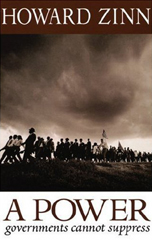
Two recent books by activist historian Howard Zinn seem to have gone largely ignored by the so-called mainstream media. This slim volume by the author of the increasingly relevant and important A People’s History of the United States is another collection of recent speeches and articles that, as Howard states:
…assembles my most recent writings on a variety of subjects, from the war in Iraq to essays on Eugene Debs, Henry David Thoreau, and Sacco and Vanzetti. The central theme is probably best expressed in the final essay, “The Optimism of Uncertainty,” in which I draw upon historical experience to suggest that the apparent power of governments and corporations is in fact fragile, that it rests on the obedience of the citizenry, and when that obedience is withdrawn, extraordinary change can take place.
Of course, the passage that follows, from the section “Governments Lie,” may suggest the reluctance of the government’s handmaidens in the press to recognize Howard Zinn:
Our leaders on the other hand continue to plant the belief that we are entitled, because of our moral superiority, to dominate the world…What is the idea of our moral superiority based on? Surely not on our behavior toward people in other parts of the world. Is it based on how well people in the United States live? One of five children in this the richest country in the world is born in poverty. There are more than forty countries that have better records on infant mortality. Cuba does better. And it is a sure sign of sickness in a society when we lead the world in the number of people in prison—more than two million… A more honest estimate of ourselves as a nation would prepare us all for the next barrage of lies that will accompany the next proposal to inflict our power on some other part of the world…
